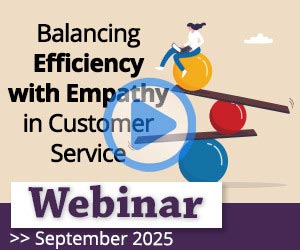Boosting telesales productivity isn’t just about making more calls, it’s about working smarter.
From improving call structures and empowering advisors to fostering motivation and engagement, small changes can deliver big results.
While incentives, coaching, and motivation are often the go-to solutions, even small, often overlooked adjustments can lead to significant improvements in sales results.
To help you boost the productivity of your telesales team, we asked our panel of industry experts for their top strategies.
25 Telesales Tips to Improve Productivity
1. Implement a Phone-Call Blueprint

A key approach for improving outbound telesales productivity is to implement a blueprint strategy. A call blueprint should not be confused with a script, where a script presents a set of questions and phrases for the agent to use during a call; this can affect conversation flow in the sense that it veers away from the customer’s needs to the agent introducing specific terms and phrases, which may not always be in context.
On the other hand, a blueprint provides a call structure with ‘check points’ along the route. As part of this approach a telesales agent should first complete pre-call planning, ensuring that they have clear call objectives, understand what they are selling and why the customer would have a need for the proposition, and helping them to maintain a positive attitude!
Other ‘check points’ forming part of the blueprint approach include:
- Clear Introduction – this must stimulate interest.
- Effective Questioning – ask probing and leading questions to ensure the conversation goes in the direction you intend; for example, what are their key issues and challenges?
- Summarise – clarify that you have correctly understood the customer’s situation and needs.
- Present the Solution – in a way which is clearly linked to the customer’s need, highlighting how your solution solves their problem.
- Handle Objections – anticipate likely objections to the proposition and clearly articulate how the solution will work around those issues.
- Close – ask for the order if appropriate but always ensure that you summarise the next steps and who will do what by when.
Contributed by: Business Systems (Julie Kerman)
2. Encourage Sales People to Use a Pull Communication Style
While researching for a high-street optician, Carolyn Blunt discovered that some advisors took 240 seconds to book appointments, while others took twice as long.
The difference? Advisors used two distinct communication styles. Those using a “push” style provided lengthy descriptions and multiple options, while others used a “pull” style, asking direct questions to guide the conversation more efficiently.
The “pull” method, with questions like “what is the best location for you?”, saves time by focusing on customer priorities and allowing advisors to make quicker decisions.
3. Don’t Pressure Salespeople by Squeezing Wrap Time

If you pressure staff during wrap time by focusing on time-based metrics, it is likely that these advisors will start making notes from the previous call whilst they are greeting the next caller.
If advisors are doing this, it is likely that they will miss information from the first 20 seconds or so from the beginning of the call, meaning that they may fail to gauge the customers mood, personality or the demographic that the caller falls into.
Worse still, advisors could have missed information that they were not quite ready for. This would result not only in the customer having to repeat themselves, something they will not appreciate doing, but also Average Handling Time would increase.
So, empower advisors with sufficient wrap time to make sure that they are at their most productive on the call.
For more about wrap time in the contact centre, read our article: What Is Wrap Time and How Can I Reduce It?
4. Control the Call: Use Signposting
Signposting is a communication technique that involves using phrases like “in a moment” to provide customers with a clear preview of what’s coming next.
This helps to streamline the conversation and boost productivity. For example, saying, “In a moment, I will give you a reference number, so please have a pen handy,” prepares the customer to have writing materials ready.
By incorporating signposting, you can prevent delays caused by customers searching for a pen, leading to a smoother and more efficient interaction.
Contributed by: Carolyn Blunt
For more from Carolyn on signposting, read the piece: Signposting – A Technique for Reducing Your AHT by 15 Seconds
5. Let the Sales or Telemarketing Team Work From Home

A 20% increase in contact center productivity might seem like a dream, but it’s a common average for telemarketing advisors working from home compared to those in centralized offices.
Traditional psychology suggests that jobs with high demands and low control often lead to stress, which is a significant factor in turnover rates within contact centres—an issue that hampers productivity.
Home-based advisors demonstrate the benefits of granting trust and autonomy to individuals. This approach highlights a valuable lesson for all contact centres: empowering employees can lead to remarkable improvements in performance.
Contributed by: Dr Nicola Millard (BT)
6. Empower the Sales Team to Make Their Own Decisions
If you want your telesales team to be productive, it is important for them to make decisions that represent what the customer wants. This is difficult to do when rigidly following a script, as you can often bring in unnecessary trivia, which prolongs the interaction.
So, trust your team to make calls relevant and useful instead of debating on an issue that bears little significance to the matter at hand.
Whilst this may be difficult at first, advisors will learn from their mistakes if you give them sufficient time. After all, empowerment comes from involvement, and learning from mistakes, through self-learning or 1-2-1 coaching, will help the telesales team to find better solutions and in time boost productivity.
For more on the topic of employee empowerment in the call centre, read our article: What Does Employee Empowerment REALLY Mean?
7. Encourage and Manage the Use of Empathy
Building strong relationships with customers is closely linked to profitability, and research shows a direct correlation between empathy, productivity, and Average Handling Time (AHT).
When advisors cultivate an empathetic connection with customers, they can identify issues more quickly and resolve them more effectively, thanks to the trust they’ve established.
As a result, customers are more willing to engage in open conversations, sharing their complete stories rather than just fragmented details. This deeper understanding ultimately leads to better outcomes for both the customer and the business.
Find examples of showing empathy in our article: 18 Empathy Statements That Help Improve Customer-Agent Rapport
8. Ask the Telesales Team to Share Their Advice

Engaging the telesales team in efforts to enhance productivity can yield significant benefits, as they have firsthand experience of the challenges they face daily.
Salespeople are well aware of the pain points, inefficiencies in systems, and disjointed processes that can hinder performance.
Unfortunately, opportunities for telesales teams to contribute to realigning processes or developing new procedures to boost productivity are often limited.
By tapping into their insights, organizations can drive meaningful improvements and foster a more collaborative work environment.
Contributed by: Martin Jukes
9. Tie Everything That Can Be Measured to an Incentive
Effective incentives can include shift preferences, vacation approvals, or team celebrations. Salespeople are often more motivated when there’s something at stake, and fostering healthy competition for rewards can significantly boost productivity.
Additionally, implementing an incentive scheme provides a consistent way to recognize hard work, and cultivating a culture of appreciation can enhance both morale and performance.
For more on running great incentive schemes in the call centre, read our article: How to Make the Most of Your Staff Incentives – With Examples
10. Contests are a GREAT Way to Get a Quick Productivity Boost
Healthy competition can work wonders in a contact centre, so why not organize head-to-head contests between teams? One month could focus on handle time, while the next could highlight upselling opportunities. Encourage teams to take pride in their stats and engage in playful banter with one another.
This approach can significantly enhance team morale, and the resulting productivity boost from everyone striving to meet their goals is always beneficial, especially in outbound telesales.
11. Implement a Scorecard System

If your contact centre doesn’t have an advisor scorecard system, it’s time to catch up. Even starting with a single measurable goal can motivate advisors to aim higher and prevent mediocrity from taking hold.
However, be cautious to ensure that your goals are productive. Centres that only measure “calls handled” often find that agents rush through calls too quickly, compromising quality.
It’s essential to track a balanced mix of productivity metrics, quality scores, and customer satisfaction. This way, you’ll identify your top agents and be able to reward them appropriately.
Contributed by: Dave Hoekstra
12. Measure the Right Metrics and Provide Feedback
Setting appropriate and motivational targets for your sales team is essential for boosting productivity, but it’s crucial to identify the right metrics.
Remember that the most effective targets aren’t always the easiest to measure; focus only on metrics that will be reviewed, analysed, and acted upon.
Additionally, ensure that the metrics are relevant to your current needs, as these can change over time. Once you’ve addressed a specific “productivity blocker” and are confident it’s resolved, shift your focus to measuring other important areas.
Finally, prioritise identifying and acting on trends rather than reacting to one-off occurrences. Some companies jump to address isolated survey feedback, but it’s far more effective to look for patterns that can lead to meaningful improvements.
13. Acknowledge Human Nature in Productivity
Setting targets for your telemarketing team is just the first step; understanding the underlying reasons behind these targets is equally important. If advisors perceive a target as critical without context, they may look for shortcuts, especially if targets are linked to pay.
These shortcuts, or “cheats,” can lead salespeople to bypass essential steps such as establishing rapport and demonstrating empathy. While this might reduce talk time, it often comes at the expense of maximizing performance and could ultimately result in a lower sales-per-contact ratio.
Contributed by: Paul Cooper
14. Give Telesales People the Chance to Move Around and Sound Energised

It is important to sound authoritative and energised about the product or service you are selling.
Wireless headsets provide users with the ability to stand up and move around the office, which in turn helps the telesales or telemarketing agents open up their lungs and project their voices more effectively, as well as getting the blood pumping to keep them feeling more awake when on the call.
Contributed by: Richard Kenny
15. Increase Team Engagement
We have enhanced our workforce productivity by implementing a proactive staff engagement strategy.
This approach was designed to maximize our investment in employees, and by leveraging cutting-edge workforce management technology, we significantly increased the amount of one-on-one and team interactions with our staff.
This has fostered a positive environment where employees recognize their crucial role in the success of our business.
As a result, we have seen improvements in schedule adherence, conformance, and other productivity metrics, alongside boosts in employee engagement and customer satisfaction.
Contributed by: Andrew Harvey
16. Encourage Your Telesales Team to State Their Schedule Preferences
Allowing, and in fact encouraging, advisors to establish their preferred work schedule has been shown to improve employee morale, increase employee and customer satisfaction, and improve key operational metrics in the call centre.
Therefore, telesales people should have a way to communicate their preferred work times without prior consent, available times with prior consent, and unavailable times.
One way to easily take these preferences into account when creating agent schedules is to implement a feature-rich (but not necessarily costly) workforce management system.
Contributed by: Simon Angove
For more on this topic, read our article: How Do I… Manage and Schedule Multi-Skilled Agents?
17. Pair the Best with the Best
Aligning team leaders with their strengths and positioning team members according to their skills is a proven method for boosting performance.
We previously believed that pairing our best team leaders with the lowest performers would foster improvement. However, we soon discovered that matching top performers with each other led to significant productivity gains.
When people are good at what they do, they have added enjoyment and tend to be more productive. It’s long been accepted that if you build on your strengths instead of focusing on your weaknesses, you will be more successful.
Contributed by: Paul Lane
18. Reward with Experiences
To keep momentum going, a call center manager should offer long-term prizes of significant value, such as vacations or unique experiences. Tailoring these rewards to fit themes or seasons can add extra interest and keep the incentive program relevant and engaging.
This long-term strategy should be complemented by surprise short-term incentives and rewards given daily or weekly.
These immediate rewards can have a positive impact on morale, as they help create enjoyable memories associated with the workplace and significantly boost motivation and energy levels in the environment.
Contributed by: Andy Philpott
AO use this premise in their contact centre, and you can learn more about how they do so by reading: 17 Things You Can Learn from the AO Contact Centre
19. Reduce the Administrative Burden so Advisors Can Focus on Closing Sales

In a telesales call centre, agents often spend 10–40% of their time managing lead data and navigating multiple databases.
By automating sales and telemarketing management and integrating CRM into a single agent desktop, agents can focus more on engaging with customers.
Real-time data from both front- and back-office systems can be aggregated and presented to agents, providing relevant cross-sell and up-sell opportunities.
This integrated approach allows the system to learn which agents excel at closing specific types of leads, enabling smarter routing of future calls and emails.
Such automation can significantly enhance productivity, as shown by Babcock International, where agents’ success rates increased by 30–40% due to spending more time with customers.
Contributed by: Susannah Richardson
20. Focus on Resolving Issues
Before reaching out to a sales prospect, it’s crucial to remember that the focus should be on resolving their issues and delivering key benefits—not merely promoting your products or services.
Identify what will provide genuine value to the prospect, and offer them something useful, such as a free sample or a no-strings-attached trial. Consider their perspective: how could your product or service improve their lives?
When you convey your message, do so with enthusiasm and energy, ensuring the prospect knows you genuinely believe in what you’re offering.
Contributed by: Mark King (Aspect)
21. Understand That Rapid Peaks in Call Volumes Will Have a Negative Impact on Sales

Rapid peaks can also be responsible for low employee morale and, in the case of customer complaints, increase the time to complaint resolution, further damaging brand and reputation.
Most customers forced to complain feel vulnerable and agents feel the brunt of this. By having the means to be proactive, the agent can quickly calm the customer and start the resolution process.
By identifying complaint trends by using root-cause analysis, the management team has the knowledge needed to prepare agents and to put resolution strategies in place.
Staffing in line with predicted call peaks reduces call answer time and the ferocity of the caller. It will also help to drive sales!
Contributed by: Paul Elswood
22. Put Emphasis on Key Competencies

Contact centres are driven by targets and rankings, but many are beginning to recognize the value of making their advisors feel appreciated.
Measuring competencies and company values among staff is essential for fostering their development. Focusing on these areas not only supports staff growth but also serves as a strong incentive for both employees and the organization.
Telemarketing managers can assess competencies by providing expectation ratings and final evaluations, which highlight individual development. Self-assessment options can also empower staff to take ownership of their growth.
By aligning call types with specific competencies and skills, you can enhance multi-skilling initiatives and incorporate them into a comprehensive development plan. This approach will improve agents’ ability to handle various call types, ultimately boosting overall productivity.
Contributed by: Shirley Barnes
23. Offer Banked-Hours to Provide Down Time

Our banked-hours scheme allows staff to enjoy sunny summer afternoons by banking hours for later use.
These accrued hours can be utilized during peak winter periods, leading to savings on recruitment and training while helping us retain our experienced workforce.
Recognizing the challenges of call centre work, we encourage downtime after difficult calls. This practice helps operators feel positive and refreshed for their next interaction, ultimately reducing days lost to sickness.
Contributed by: Neil Picton
24. Make Moves to Improve Internal Communication

Effective internal communication is essential for a productive telesales or telemarketing environment.
Ensure that teams and individuals are kept up to date on targets, deadlines, and deal information, so everyone remains aligned and focused on shared goals.
Additionally, consider holding regular debriefs to share insights and updates, fostering a culture of continuous learning and improvement among employees.
Contributed by: Mark Brown
For more on this topic, read our article: How to Improve Internal Communication in the Contact Centre
25. Put up Caller Information on the Telesales Person’s Screen

First impressions matter, and displaying caller ID as soon as a call comes in helps staff prepare to handle incoming inquiries effectively.
Implementing straightforward procedures, such as automatically routing calls to the appropriate department, ensures that inquiries are resolved quickly, enhancing service and saving time for both customers and salespeople.
Furthermore, by integrating a telephony system with other applications like CRM, staff can manage all incoming and outgoing calls from a single screen.
This streamlined approach saves time, allowing the sales team to access customer information from one central source instead of navigating multiple systems.
Contributed by: Jonathan Gale (NewVoiceMedia)
Two Essential Factors
In addition to these strategies, there are two essential factors that many successful call centres already have in place: paying staff fairly and offering clear, motivating incentives. These ensure that your team feels valued and driven to perform at their best.
Equally important is hiring the right people—those who are eager, motivated, and ready to succeed from day one. Pairing this with experienced managers who understand the realities of phone sales can create a strong foundation for a productive, high-performing telesales team.
For more on better supporting your telesales team to drive improved results, read our articles:
- 10 Strategies for Overcoming and Handling Objections in Sales
- The Right Words and Phrases to Use on a Sales Call
- Top Tips for Selling Over the Phone
Author: Jo Robinson
Reviewed by: Robyn Coppell
Published On: 11th Apr 2017 - Last modified: 28th Oct 2025
Read more about - Skills, Alvaria, Andy Philpott, Business Systems, Carolyn Blunt, Dave Hoekstra, Empathy, IFS, Incentives, Jonathan Gale, Mark Brown, Martin Jukes, Morale, Motivation, Nicola Millard, Outbound, P Cooper, Paul Lane, Poly, Productivity, Richard Kenny, Scorecards, Simon Angove, Skill Development, Susannah Richardson, Telesales, Vonage







































